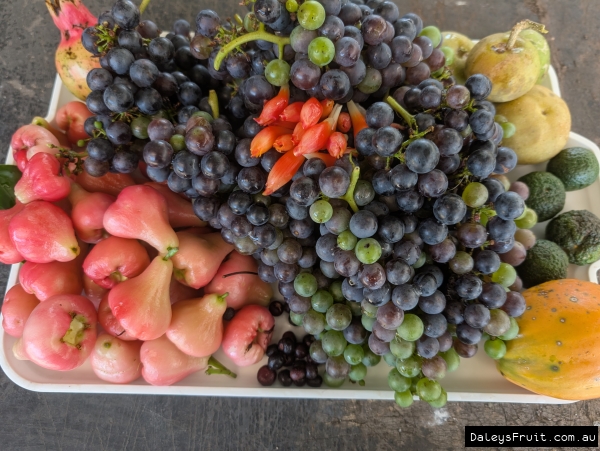Subtropical Fruit Trees
CategoryAvocado Tree
Fruit Trees > Subtropical Fruit Trees > Avocado Tree
A valuable commercial crop, the avocado tree thrives on rich well-drained soil. Due to flowering habits, avocado varieties are categorized into A and B groups. One variety is sufficient to produce adequate crops for the home garden, however by planting a tree from both groups the harvest will be much greater. Avocados begin to ripen once picked and may take up to 10 days to reach maturity. Full size, harvestable Avocadoes can hold on the tree for weeks and you can pick as needed. Fruits are rich with oily flesh and are delicious eaten when fully ripe in sandwiches, salads. Guacamole is a famous blend of mashed avocado flesh, lemon or lime juice, onion, garlic, pepper and chili, it makes a very tasty dip. Avocados are very fussy about their soil conditions and will not tolerate wet feet or heavy soils, it is essential to prepare the ground for an avocado well before planting. Young trees are susceptible to sunburn and damage from frost so a small shelter while they establish is a very good idea. Advanced Information DPI Avocado Information Kit FAQ Avocado DPI QLD Avocado Factsheet - Explains A & B types, Location & Planting, Pruning and much more.
Black Sapote
Fruit Trees > Subtropical Fruit Trees > Black Sapote
Not surprisingly this is one of our most popular fruits and if you like Chocolate you'll love Black Sapote. Commonly known as Chocolate Pudding Fruit this amazing fruit is low in fat and an excellent source of Vitamin C containing about 4 times as much as an orange. The fruit is delicious eaten fresh or used as a chocolate substitute in recipes and milkshakes or simply mix the pulp with yogurt and lemon juice for a refreshing treat. Fruits can be cut in half and eaten covered in passion fruit, in Mexico the pulp is mashed with orange juice or brandy and served with cream, it is also delicious mixed with wine, cinnamon and sugar. The green fruit is picked when hard and allowed to soften and go brown within 3-6 days. At the ripe stage - you should be able to press the skin with your fingers and leave an indent. A very close relative of the persimmon the black sapote is a Chocoholics dream come true!
Blueberry
Fruit Trees > Berries Vines and Climbers > Blueberry
Fruit Trees > Subtropical Fruit Trees > Blueberry
These varieties of blueberry plants perform well in Australia and provide a bounty of berries. To grow successfully provide organic matter and ample moisture along with a soil pH of 5.5, so if you have alkaline soil you need to consider growing these in pots. Blueberries make excellent potted specimens provided 25% of Peat Moss is added to the potting mix, or use a dedicated acid medium prepared for Azaleas. Potted plants are a great gardening project for children, who delight in harvesting the fruit. Low chill varieties such as 'Misty' and 'Sharpblue' can be pruned after cropping to induce a second crop that will ensure a supply of delicious fruit throughout the year. 'Sunshine Blue' is a very small bush and self-pollinating so great for balconies. Select for Southern Highbush varieties if you are in warm temperate or subtropical areas. Select Northern Highbush varieties for cool temperate areas. Highbush varieties are self-pollinating but generally produce more fruit when grown with another variety from within the same grouping. Rabbiteyes are well suited to warm areas and are vigorous bushes. They are a separate grouping for pollination purposes and do need to be grown with a pollinating pair. So select varieties from within this grouping to promote fruit setting. 'Brightwell' is partially self-pollinating. Blueberries, apart from being delicious, have many fantastic health benefits. They are extremely high in antioxidants, and have anti-inflammatory properties, as well as lowering cholesterol in the blood, it is also claimed that they improve motor skills, balance and co-ordination in elderly people. The longer the fruits are left on the bush to mature the greater the health benefits are so if you can beat the birds leave the fruits to the last minute to pick. Bird sage netting is the best way to do this. Blueberries can produce an abundance of fruit over many months, keep them evenly watered with good drainage and use a low nitrogen fertiliser. They are such a great addition to all gardens, from balcony to food forest. Get growing now.
Brazilian Cherry
Fruit Trees > Subtropical Fruit Trees > Brazilian Cherry
The fruit is delicious eaten out-of-hand or as an ingredient in jelly, sauce and pies.
Cherimoya
Fruit Trees > Subtropical Fruit Trees > Cherimoya
Its possible that no known fruit compares to the delicious taste of the cherimoya. The white flesh is luscious, soft and sweet and is described by many as having the flavour of Mango, pawpaw, bananas and coconut. They're absolutely delicious when devoured icy-cold from the freezer and eaten like ice-cream. A large evergreen tree with flowers and a scent just like the fruit tastes. Very closely related and similar in appearance to the custard apple. Cropping as far south as Melbourne.
Custard Apple Tree
Fruit Trees > Subtropical Fruit Trees > Custard Apple Tree
Custard apple trees grow on an attractive small to medium sized tree that is similar in habit to the cherimoya. The open, spreading canopy is made up of long drooping branches that can often touch the ground. This tree offers delicious fruit and succulent soft white flesh that is delicious eaten fresh or blended into icecream or as a rich creamy drink.
Feijoa Tree
Fruit Trees > Subtropical Fruit Trees > Feijoa Tree
The Feijoa is sometimes called the pineapple guava, from its unique taste. Although it is in the same Myrtaceae family, it is not a guava. Becoming increasingly popular as a commercial crop, the fruit has the taste and aroma of strawberry, pineapple, lemon, passionfruit and guava. The oval fruit is green as it develops and stays this way as it ripens, most fruits are about 50mm long but some commercial varieties can be up to 75mm long, and half as long. Fruits will ripen from March through to June. The tiny edible seeds are embedded in a jellylike centre. The spectacular purple, dark red and white flowers have sweet delicious petals that also make a superb ingredient in sweets and drinks. Trees are very attractive and can be planted to form beautiful flowering and fruiting hedges, screens or windbreaks. The grey-green foliage is wind tolerant. They espalier well and can be trained as a small standard tree or a multi-trunked specimen. They are well suited to pot culture and even seedling trees will produce flowers and fruits after as little as three years. Netting is recommended to prevent bird and fruit fly attack. Trees can grow as high as 4 metres, but can be pruned to between 2-3m. They can tolerate temperatures down to -10C, typical of the region of origin in southern Brazil, Uruguay and Argentina. They like slightly acid to neutral free draining soil, and are not tolerant of water logging. They can be quite drought tolerant but best results are achieved when kept water to establish and during flowering and fruiting. While they fruit in warmer climates the best flavour develops in cooler areas. If you think your area may be too warm for full flavoured fruit, grow them for their sweet, edible flowers.
Governors Plum
Fruit Trees > Subtropical Fruit Trees > Governors Plum
A small tree that bears large edible berries of dark purple to black and is similar in texture to a European plum. The grafted variety is thornless and self pollinating. An attractive tree with coppery new growth. Hardy and easy to grow. They are the tropical equivalent of the damsons plum and like them, the Governor's plum also have enough pectin to make good jams and jellies. Seedling plants can be use to create an impenetrable hedge due to their formidable thorns.
Grumichama
Fruit Trees > Subtropical Fruit Trees > Grumichama
This fruit is the tropical equivalent of the cherry and just as difficult to resist. The purplish-black fruit is borne in clusters and is delicious eaten fresh. The sweet white flesh is highly prized for jams, jellies and pies. If you are looking for a spectacular ornamental specimen than it would be hard to go past this tree with its magnificent flowers, glossy dark green foliage and full growth habit. The tree is hardy to most conditions provided you can offer it protection from frosts paricularly when young. It can withstand light frosts once established. While the tree will still retinly its highly ornamental qualities during drought periods, the crop quality deteriorates if adequate water is not available during fruit development.
Guava Tree
Fruit Trees > Subtropical Fruit Trees > Guava Tree
The Guava Tree is a sweet, fragrant tropical fruit which ranges in size from a small egg size to that of a medium apple. To eat raw, guavas should be very ripe when they are sweet, creamy and delicious. They make excellent jams, preserves and sauces too. Guava trees are very attractive with blotchy patched bark in greens, browns and creams. They have pretty fluffy flowers typical of their family, the Myrtles, and are ornamental whether in fruit or flower. Some varieties have burgundy foliage. Guavas are ideal for use as fruiting hedges, landscaping trees and as ornamental potted specimen trees where they will be happy to produce masses of fruit. The strawberry guava is more suited to smaller gardens because of its compact growing habit. Guava trees need protection from fruit fly and birds, which may spread the seed to create weed trees.
Jaboticaba
Fruit Trees > Subtropical Fruit Trees > Jaboticaba
The jaboticaba fruit tree has a habit of producing the fruit directly on the trunk makes this a striking tree. The black fruit has an edible thin, but tough skin. The texture is similar to a grape with a sweet and aromatic flavour. Cropping can begin at 5 years with several crops maturing from spring to autumn. A versatile small tree with decorative coppery foliage that makes for an ornamental specimen tree or superb hedge.
Longan Tree
Fruit Trees > Subtropical Fruit Trees > Longan Tree
A close relative to the Lychee tree but much larger, stronger and more cold tolerant. The fruit is deliciously sweet, bearing just after the lychee, so for Lychee lovers this is a welcomed taste variation to look forward to. A highly ornamental tree with beautiful green leaves and clusters of yellow flowers that have a wonderful scent.
Loquat Tree
Fruit Trees > Subtropical Fruit Trees > Loquat Tree
This popular evergreen fruit tree has been under cultivation for over a century throughout many parts of Australia. It has beautiful downy foliage, fragrant flowers, delicious fruit, and it's easy to grow! The golden-yellow fruit has a pear-like flavour with a touch of apricot and pineapple. It is delicious eaten raw, stewed, preserved, dried and the roasted seeds can be used as a coffee substitute.
Lychee Tree
Fruit Trees > Subtropical Fruit Trees > Lychee Tree
Described as the most luscious of all fruits, the lychee is native to Southern China. Fruits have reddish skin and the translucent flesh is sweet and juicy. Its hard to stop at one. For best results lychee's require seasonal temperature variations, warm humid summers and cool dry winters are the ideal climate for growing. They are a handsome, dense rounded tree that can be susceptible to damage from strong winds. We strongly advise the purchase of marcotted trees as they bear in as little as 3 years. The varieties below have proven to be some of the best croppers in a subtropical climate. Its very important to eat Lychees when fully ripe, as they contain toxins that are harmful to health when unripe
Mango Tree
Fruit Trees > Subtropical Fruit Trees > Mango Tree
Fruit Trees > Tropical Fruit Trees > Mango Tree
The Mango Tree is one of the most luscious of all tropical fruits with flavours varying from exceptionally sweet to turpentine. By planting different varieties of mangoes harvesting can be extended for up to 12 weeks.
Pepino
Fruit Trees > Subtropical Fruit Trees > Pepino
A small satin-like fruit streaked with purple stripes and varying in colour from golden-yellow to apricot. The pale yellowish-green flesh has a juicy melon-like texture. It is a delicious subtle flavoured fruit similar to a honeydew or rockmelon. Closely related to the tomato this shrub grows in a sprawling habit and makes an excellent ground cover plant. It tends to fruit better when grown over a trellis. The foliage is susceptible to damage by light to moderate frosts, however will quickly recover with warmer weather.
Persimmon
Fruit Trees > Subtropical Fruit Trees > Persimmon
Fruit Trees > Temperate Fruit Trees > Persimmon
A very attractive deciduous tree with spectacular dark-orange autumn foliage. The latin name Diospyros translates as " Food of the gods" which is very appropriate when describing the melting flesh of the persimmon fruit. The two fruiting types are made up of astringent and non astringent. The difference being astringent fruit must be left until they soften, astringency is the dry, mouth puckering sensation caused by the tannins in the unripe fruit. Non astringent persimmons do not have this effect, they can be eaten crunchy straight from the tree. Eaten fresh they are delicious, they can also be frozen, dried, made into beer ,wine or cider. They are very versatile in the kitchen and are used in pies, salads, ice cream, juices, and dressings. Dried fruit lose all their astringency, other methods are to freeze fruits for 24 hours or place them in a bag with a ripening banana as it releases ethylene which hastens the ripening process.
Pineapple
Fruit Trees > Subtropical Fruit Trees > Pineapple
Pineapples are a member of the bromeliad family and have attractive and interesting flowers as well as delicious fruits. They require full sun in a tropical or subtropical climate.
Tamarillo
Fruit Trees > Subtropical Fruit Trees > Tamarillo
Tree Tomato is a fast growing small tree that bears heavy crops of red or yellow sub-acid succulent fruit. The fruit has many uses apart from being eaten fresh, such as being cooked in any way tomatoes would be cooked. Tamarillo chutney and jam is a taste treat. The yellow fruiting variety is usually milder and sweeter with slightly smaller fruit. Tamarillos are very quick growing and will crop in 18mths reaching a height of 2-3 metres. They require well drained soil and protection from wind and frost.
Wampee Tree
Fruit Trees > Subtropical Fruit Trees > Wampee Tree
This attractive, evergreen, slender tree has been described as the finest fruit of Siam (Thailand). It is also a highly valued backyard tree in southern China and south and east Asia. It is classed as a subtropical fruit but is relatively hardy and can withstand light frosts. This tree is a relative of the citrus family, thus its ability to grow in coastal Australia as far south as Melbourne and inland where the frosts are not too severe. The fruits are highly aromatic and can be sweet to tangy to almost sour depending on the variety and ripeness. Straight from the tree wampees are very refreshing, thirst quenching and cleansing to the palate. They form in clusters from a few up to eighty in one bunch. The fruits turn yellow when ripe and have a thin, sometimes brittle skin, somewhat like paper. They generally have only 1-2 seeds in each fruit and are best left to ripen on the tree for as long as possible. They are a very attractive looking tree that can grow up to 8 metres with, beautiful dark green ruffled compound leaves. They have a dense growth habit making them an ideal shade tree. Wampees should be treated very much like any of the other citrus trees in regard to cultivation. A sunny, well drained site with plenty of water and organic matter should see these trees thrive. The crop is borne solely on the tips of branches, so the less pruning the better. Very few problems have been observed with pest and diseases other than occasional infestations of aphids. Mature trees can produce up to 50kg of fruit each year. Like its close relative the citrus it is full of vitamin C, approximately 28mg per 100g. This fruit can be used for making jams, jellies, pies, drinks but best eaten fresh, straight from the tree. If you want them to keep a bit longer you can try leaving the stalks on them.
White Sapote
Fruit Trees > Subtropical Fruit Trees > White Sapote
The Casimiroa or white sapote as it is also known is native to the Mexican highlands and Central America. It is a pleasurable tasting fruit reminiscent of vanilla custard mixed with creamy banana and peaches. Although often called a white sapote it is not a member of the sapote family. The yellowy-green skinned fruit has white flesh and is used primarily as a dessert fruit. The trees have a very appealing drooping habit with long branches that can almost touch the ground. They are fast growing with two main spurts, once in early spring and again in early autumn. Casimiroa trees fruit prolifically and a healthy mature tree can produce 1000 fruit per year. They are also long lived and can crop for 100 years or more. Fruits should be picked when they are just beginning to soften and change colour from green to yellow, if picked too soon they are astringent. Do not plant close to paths or buildings as they can have troublesome root systems.








































































































































































































































































































































